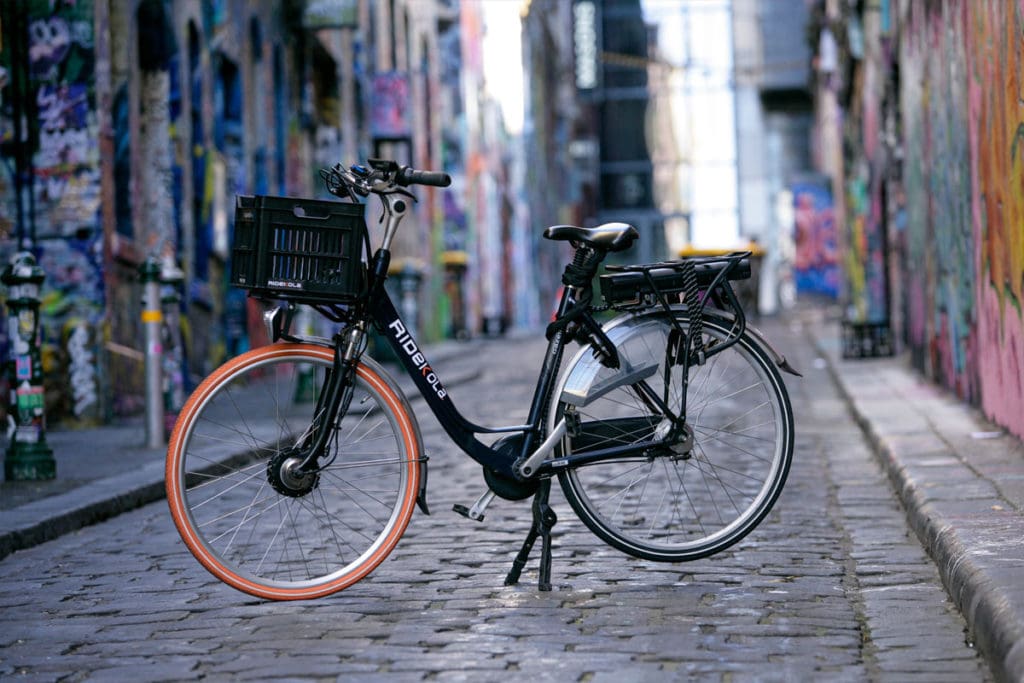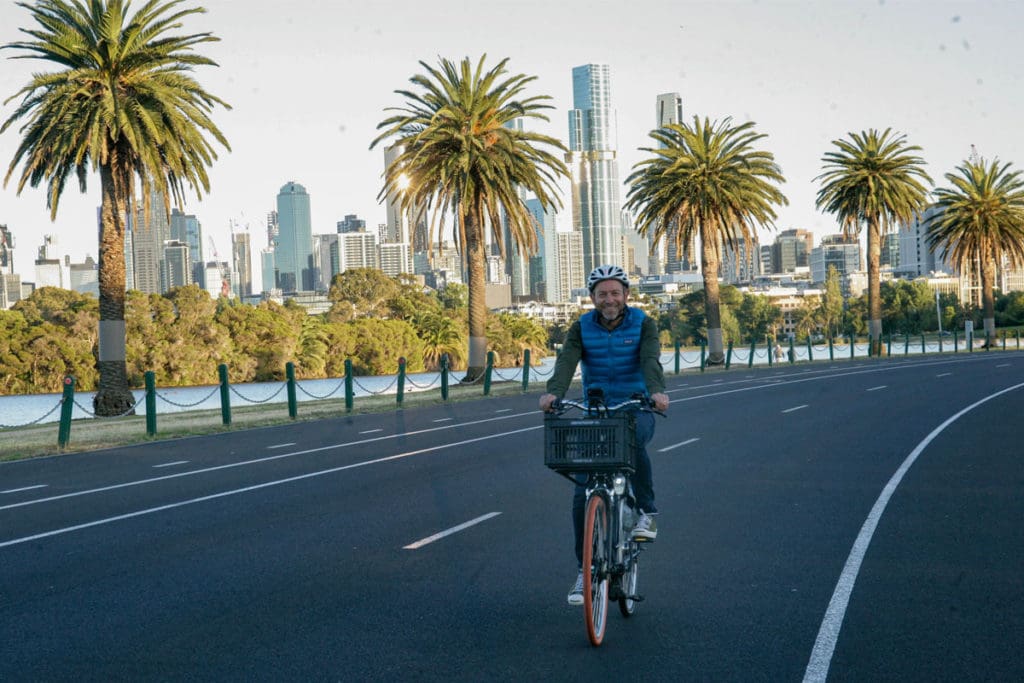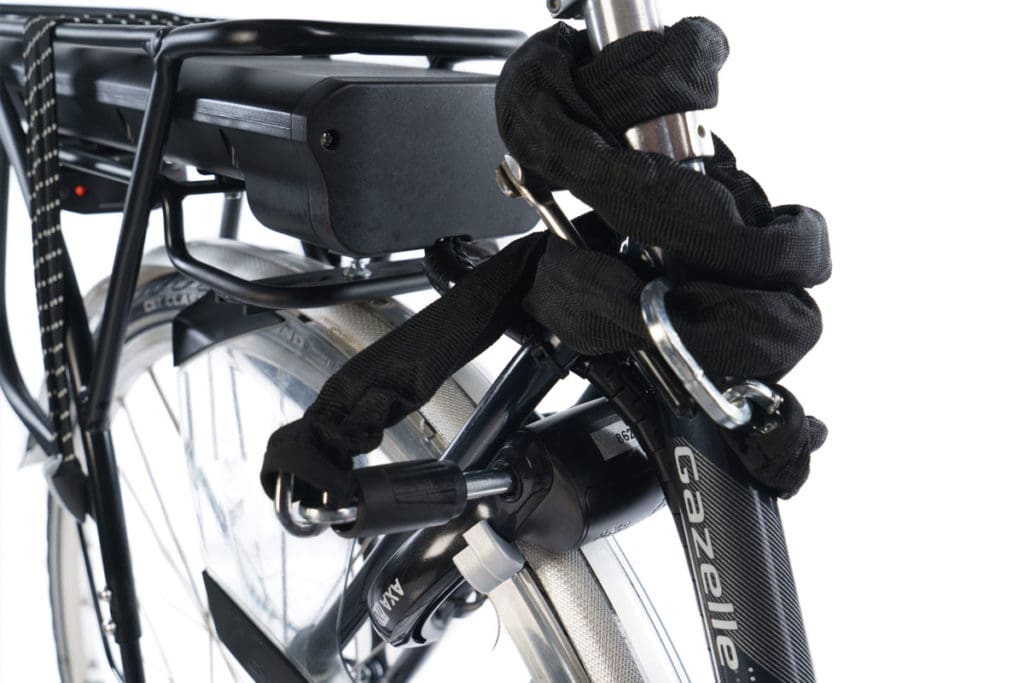Ride Kola Adds Recycled Flavour to Subscription Market

Melbourne, Victoria
Melbourne will soon be host to a new recycled e-bike subscription service its founder and long-standing environmental advisor Chris Arnott believes is a world first.
Chris has created the Ride Kola subscription service, which will provide analogue bikes sourced from the Netherlands and re-equipped with front-hub motors, batteries, other integrated features and a supporting app.
His first shipment of refurbished Gazelle bikes is due to arrive the company’s factory in Sunshine next week and he already has prospective customers on a waiting list.
Ride Kola will initially limit its service to customers in metropolitan Melbourne and is also working on deploying trial fleets into aligned organisations from February.
“More and more businesses are recognising we’re in the critical decade and we need to do more with less – to cut our emissions, to cut down on resource use and to recycle and reuse,” he said.
Chris, an environmental advisor for 25 years, says creating a new life for the former holiday resort bikes achieves two objectives: to create a circular economy and a low-cost subscription option for urban commuter bikes.
“I built a couple of Australia’s first B Corp organisations and had sold out of my last business in 2019. This new challenge was looking at how I can do something really practical and tangible to address those issues that are getting more and more acute, like climate change, resource use and creating more liveable cities,” he said.
“It’s very much about how many barriers can we lower to get more people to see cycling as a transportation option.”
“I’ve also been a lifelong cyclist, both for recreation and transport, and have spent quite a bit of time in Europe over the course of my life. I’ve seen how cycling can deliver amazing outcomes for individuals and communities.
“There’s a really exciting shift happening in short-trip transport when you bring in electrification, though it’s still fairly nascent in Australia. We’re seeing some great businesses emerge but there’s a lot of opportunity for more exciting solutions.”
He said subscription fits a growing niche between full ownership and the share space.
“When you look at research around the globe, subscription always comes out in the top two or three areas of likely growth. It’s very much about how many barriers can we lower to get more people to see cycling as a transportation option,” Chris said.
“Subscription removes the large initial outlay – these bikes would cost $4,000 to $6,000 to buy new – and allows them to easily update.
“I’m sure we’ll get customers that are already riding and are attracted to the solution of subscription e-bikes but this is really targeting people currently doing the typical commute by car and wanting a more environmentally friendly and convenient way to move around town.
“There’s increasing frustration about the rising cost of cars. The AAA (Australian Automobile Association) just put out its most recent quarterly statement and a car in Melbourne costs the average family over $200 a week now.
“They’re big dollars for a lot of households.
“There’s a misconception that we’re a big country and we drive long distances. But the reality is 50% of all trips are less than 5km and it’s even worse in regional centres.”

Functionality over Commodity
He said he believed Ride Kola’s refurbished and re-equipped step-through Gazelles were the best option to tap into these potential customers, who were purely focused on functionality and convenience.
“We’ve taken the battery size as low as we think we can, to save on weight, resource use and cost to the end user.”
Amid a growing market of premium and fully-integrated e-bikes, Chris said he is “really keen to get people cycling who are not interested in what they are riding or where the battery is located, just how it can get them where they need to go”.
For that reason, Ride Kola is bucking a trend of increasingly larger batteries with expanding range between charges.
“Going with a retrofitted analogue bike gives us more flexibility on a couple of fronts. It makes the solution closer to what I want to have on the platform, including the size of the batteries,” he said.
“A lot of e-bikes now have batteries far bigger than what the bulk of our users are going to need, which increases weight and cost. It increases resource use in an element of the bike that is going to incur the greatest wear and tear with recharging cycles.
“We’ve taken the battery size as low as we think we can, to save on weight, resource use and cost to the end user.
“Our bikes will typically get 30-50km of range. Most people do 10-20km loops, whether it’s to work, the gym or the grocery run.”
Rapid Evolution of Conversion Kit Sector
Ride Kola also chose retrofitting because Chris believes the conversion kit sector will evolve quickly.
“Historially, it’s been a real DIY space, with product largely from China. But businesses are getting interested because of the demand that’s around,” he said.
“There are companies putting conversion kits into the lease space. We can end up with a very aligned business partner that wants to produce a super high quality conversion kit that is a robust as possible.
“It can have a modular nature to it, so the resources in it are as recyclable and swappable as possible, which really goes to the heart of the values of our brand.”
Ride Kola is fitting its penultimate generation Gazelle Orange C7 step-throughs with a Panasonic rear rack battery and a Bafang 250-watt front hub motor.
They are also fitted with integrated lights that are on whenever the bike is switched on, to increase safety and ease of use.
All that retrofitting is done by a partner company in a Dutch factory and the bikes are largely assembled when they arrive at Ride Kola’s factory in Sunshine, in Melbourne’s west.
They are then fitted with a fully-recycled front basket and undergo a further quality audit.
While some subscription services offer a range of options and configurations, Ride Kola bikes will come standard with all the features needed to be fully functional and convenient.
“That includes an upgraded kickstand so the bike will never fall over, the integrated lights, an AXA Bluetooth electronic ring lock, Quad Lock phone mount and an app that maps the optimum routes,” he said.
“There’s Rider Rescue in case of a breakdown. That’s the benefit of subscription, that high-touch experience for the customer.
“Another important thing with our environment focus and circular economy approach, is we don’t want the bikes languishing in garages. We’ve got Bluetooth locks on our bikes and we can tell how often the bikes are being used.
“As a result, we can make contact with the customer and say ‘we noticed there hasn’t been any activity with the lock for the past week or two, is everything okay.”
He said Ride Kola can offer support to get them back on the ride or, if the customer’s circumstances have changed and they no longer need the bike, the company can suggest returning the bike so it can be redeployed.
“Wow, what an unusually refreshing thing to have a company that isn’t content to keep charging my credit card when I’m no longer benefiting from the subscription.”
“In other industries, something like 40 to 50% of subscriptions are dormant from the day after the person signs up. We don’t want that,” Chris explained.
“From a resource use perspective, I don’t won’t to be bringing more bikes into our platform when there are bikes already here that can be redeployed.
“It’s early days but our view is we’ll hopefully be bike constrained, not demand constrained.
“And it all comes down to customer experience, being contacted by the supplier to ask if it’s just a short-term interruption and to they need support. Even if they decide to exit the platform, they may go away saying ‘wow, what an unusually refreshing thing to have a company that isn’t content to keep charging my credit card when I’m no longer benefiting from the subscription’.”

Sourcing Closing to Home
Chris said he had looked into sourcing recycled bikes from within Australia.
“I initially sourced a bunch of second-hand bikes refurbished through a local social enterprise and I went to work electrifying those,” he said.
“That was great on a host of fronts and I learnt a heap.”
However, he quickly realised the type of product he needed for Ride Kola didn’t exist in Australia – not at the volume and quality he required.
“The reality is, in northern Europe and around the Netherlands, in a 600km radius around our factory over there, there’s just a scale and type and quality of product that doesn’t exist here,” he elaborated.
“We needed a product that is as close to a car-replacement as possible, in terms of quality and the features provided.
“It would be great to not be shipping bikes halfway around the world and in time that could be a possibility.”
“Around one million bikes go through the Dutch system each year and we’re confident it will supply sufficient recycled bikes at the standard we’ll require as we scale up.
“We’re starting with the highest quality we can get – the Rolls Royce of brands.
“Gazelle has been building bikes for 130 years and has just perfected the frame geometry, the adaptability for different rider types, the internal gearing, brakes and chain.
“The City has a step-through frame, so you can jump on in any clothing and most weather.
“It would be great to not be shipping bikes halfway around the world and in time that could be a possibility. That’s more likely to be in the five to 10-year timeframe, rather than one to two years.”
Ride Kola flew its first bike into Australia in early November and has been busy showing it to potential customers. Chris also took it to last month’s Micromobility Conference & Expo in Sydney, where he was one of the presenters.
